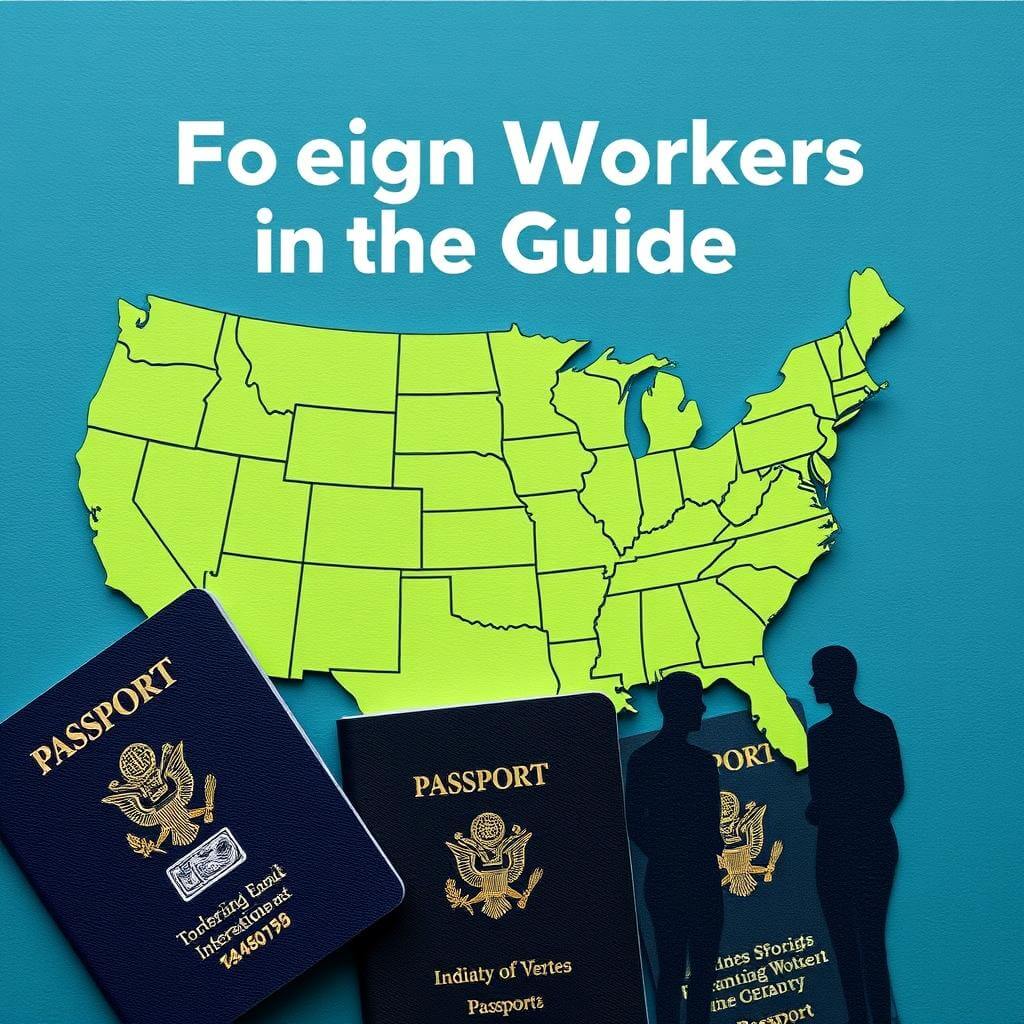
The United States boasts the largest economy globally, significantly fueled by the contributions of immigrants. Foreign nationals seeking employment opportunities in the U.S. have access to a variety of visa options, each with its own set of requirements. This guide will delve into the most common types of U.S. work visas, outlining the eligibility criteria and application processes for each. Additionally, we will discuss how these visas support the diverse workforce that continues to drive America's economic success.
Short-Term Non-Immigrant Work Visas
These visas are designed for individuals planning to work in the United States temporarily. Typically, the process begins with a prospective employer filing a petition with U.S. Citizenship and Immigration Services (USCIS). Before arriving in the U.S., the employee must also apply for the appropriate visa. This category encompasses various types of work visas, each suited to different categories of workers; details can be accessed on the USCIS website. Additionally, family members and spouses of visa holders must secure their own visas before entering the U.S.
Here are some of the most common types of non-immigrant work visas available for those looking to work temporarily in the United States.
H Visas
H-1B Visas: These are designed for individuals in specialized professions or academic fields, or those with unique expertise, who possess at least a bachelor's degree or its equivalent in work experience. H-1B visas are typically granted for an initial period of three years and can be extended.
To be eligible for this visa, applicants must have:
1. A job offer from a U.S. employer in a role that necessitates specialized knowledge.
2. Evidence of a bachelor’s degree or higher in the relevant field.
3. Documentation from the employer demonstrating the absence of qualified U.S. candidates for the position.
H-2A and H-2B Visas: These visas cater to temporary seasonal workers in agriculture (H-2A) and non-agricultural sectors (H-2B), respectively. The duration of these visas generally does not exceed one year and is tailored to the needs of employers who face a temporary increase in workload, whether seasonal or peak load.
H-3 Visas: These are intended for individuals seeking training in various fields excluding graduate medical education or any form of graduate medical training. This visa benefits non-U.S. citizens who require training that is not available in their home countries and who will utilize the skills learned in the U.S. to advance their careers abroad. It is particularly aimed at meeting the needs of special education trainers and those providing training in other specialized endeavors.
I Visas
I visas are specifically designated for members of the international media, including reporters, film crews, editors, and other media professionals working for foreign outlets in fields like print, radio, and film. These visas are granted to those representing media with headquarters based in a foreign country. Typically, I visas can be held indefinitely as long as the visa holder remains employed in the same media profession with the same company.
L Visas
L visas facilitate the temporary intracompany transfer of employees who work in multinational corporations. These are categorized into two types: L-1A for executives and managers, and L-1B for employees with specialized knowledge. The L-1A visa is valid for up to three years initially, which can be extended, while the L-1B visa is generally issued for one year. Both visa types allow for the strategic movement of key personnel to enhance business operations and foster international collaboration within the company. These visas not only facilitate the transfer of expertise across borders but also help in the global expansion of the company by allowing critical staff to work at U.S. branches or subsidiaries.
O Visas
O visas are designated for individuals who demonstrate extraordinary abilities or achievements in various fields, including the sciences, arts, education, business, or athletics. This visa category also accommodates those who accompany or assist these exceptionally talented individuals, including family members and essential support staff. O visas acknowledge and facilitate the contribution of top-tier talents to their respective fields within the United States.
P Visas
P visas are issued to outstanding athletes, artists, and entertainers, as well as their accompanying personnel, who come to the U.S. to participate in specific events, competitions, or performances. These visas are tailored to the duration of the event, tour, or season, providing flexibility and support for international cultural and sports activities. This visa category helps enrich the U.S. cultural scene by enabling the exchange of global artistic and athletic talents.
R Visas
R visas are provided to non-immigrant religious workers who are part of a religious denomination with official nonprofit status in the U.S. Applicants must be coming to work for their denomination or its associated nonprofit organization in the United States. This visa allows for religious workers to live and perform their duties in the U.S., thereby supporting the spiritual needs of their communities and fostering the growth of their religious organizations.
TN Visas Under NAFTA
TN visas enable qualified Canadian and Mexican citizens to temporarily engage in professional-level business activities in the United States, as part of the provisions of the North American Free Trade Agreement. This facilitates cross-border professional exchanges, bolstering economic ties between the countries.
Employment-Based Permanent Residency
Each year, the U.S. makes available approximately 140,000 employment-based green cards for skilled workers whose qualifications meet specific job requirements, along with their spouses and children. Permanent residency is achievable through the right mix of education, experience, and skill, often requiring a job offer from a U.S. employer who has obtained labor certification. This certification, known as ETA Form 9089 or the "Application for Permanent Employment Certification," ensures there is a genuine need for the foreign worker due to a lack of available U.S. workers in that skill area, and that hiring the foreign worker will not adversely affect the wages or employment of U.S. citizens. This stringent process underscores the balance between welcoming valuable skills and protecting local labor markets.
Overview of Employment-Based Visa Categories in the U.S.
Category EB-1: First Preference Visa
The EB-1 visa is designated for individuals demonstrating "extraordinary ability" in fields such as business, academia, research, arts, or athletics. This category does not require labor certification. Family members of EB-1 visa holders are eligible to apply for admission to the U.S. under E-14 or E-15 immigrant status, provided the primary applicant has an approved I-140 (green card) petition.
Category EB-2: Second Preference Visa
EB-2 visas cater to professionals with advanced degrees or their equivalent, those with at least ten years of experience in their profession, or individuals whose work serves the U.S. national interest. Labor certification is required for the first two categories but not for those claiming national interest. Family members can apply for U.S. entry using E21 or E22 forms, contingent upon an approved I-140 form for the primary applicant.
Category EB-3: Third Preference Visa
The EB-3 visa is available to individuals with at least a bachelor’s degree, skilled workers, and unskilled laborers who have secured a permanent job offer from a U.S. employer. Labor certification is a prerequisite for all categories under EB-3. Family members of EB-3 visa holders can apply for U.S. admission through designated forms for spouses or children, assuming an approved I-140 form is in place for the primary applicant.
Category EB-4: Fourth Preference Visa
The EB-4 visa category caters to a diverse group of applicants, including certain religious workers, employees at U.S. foreign service posts, retired staff from international organizations, and noncitizen minors under the guardianship of U.S. courts. This visa category does not require labor certification. Eligible family members may also apply for admission under this category.
Category EB-5: Fifth Preference Visa
The EB-5 visa falls under the Immigrant Investor Program. It is available to investors who either contribute 1.8 million USD to a new commercial enterprise that creates at least 10 full-time jobs for U.S. workers, or invest 900,000 USD in a targeted employment area with the same employment stipulations. This visa type also does not require labor certification, and it allows investors and their families to apply for green cards.
Student and Exchange Visitor Visas
These non-immigrant visas are designed for three distinct groups: academic students, vocational students, and participants in educational or cultural exchange programs. Each category facilitates the entry of foreign nationals pursuing structured studies or cultural enrichment in the United States.
Academic Student Visas (F Visas)
These visas are designated for students pursuing academic studies at accredited U.S. institutions. F-1 visa holders must maintain a full course of study and can engage in limited employment. During the first academic year, students are restricted to on-campus work, adhering to specific conditions.
Following this period, F-1 students are permitted to undertake three types of off-campus employment:
- Curricular Practical Training (CPT)
- Optional Practical Training (OPT), which can be either before or after graduation.
- STEM OPT for students in the fields of Science, Technology, Engineering, and Mathematics.
For family members, including spouses and children, F-2 visas provide the necessary permissions, while F-3 visas cater to Canadian or Mexican nationals who commute to the U.S. for study.
Vocational Student Visas (M Visas)
These visas are specifically for students enrolled in vocational or non-academic training programs in the U.S., excluding language training, which requires an F visa. M-2 visas are issued to family members of M visa holders, allowing spouses and children to join the primary visa holder in the U.S. Similarly, M-3 visas are available for Canadian or Mexican nationals who commute across the border for vocational study.
Cultural Exchange and Study Visas (J Visas)
J-1 Visas
J-1 visas cater to individuals participating in work and study-based exchange programs designed to promote cultural exchange. This includes roles such as au pairs, camp counselors, interns, and trainees among others. To qualify, participants must meet several eligibility criteria including proficiency in the English language. These programs are structured to enhance mutual understanding through practical experiences.
J-2 Visas
These are issued to dependents of J-1 visa holders, allowing spouses and children to accompany or join the primary visa holder in the United States during their exchange program.
Short-Term Business Travel Visas
These visas facilitate short-term travel to the U.S. for specific business-related purposes. Suitable for individuals attending conferences, negotiating contracts, or conducting estate settlements, these visas are tailored for activities that require a brief visit to the United States. The aim is to support international business operations without the necessity for extended stays.
B-1 Business Visitor Visas
B-1 visas are issued to individuals engaging in short-term business activities in the United States. Typically granted for a period ranging from one to six months, these visas can be extended for an additional six months, though it is uncommon for the total duration to exceed one year. Activities permitted under this visa include business consultations, attending professional conferences, or settling estates. Importantly, family members of B-1 visa holders are not covered by this visa type and must apply for their own B-1 visas if they wish to travel to the U.S.
GB Temporary Visitor Visas for Guam and the Northern Mariana Islands
These visas are specific to travelers heading to the U.S. territories of Guam and the Northern Mariana Islands, whether for business or leisure. Applicants must possess a return ticket and are allowed a stay of no more than 45 days. This visa facilitates short visits, making it ideal for those looking to explore the territories or conduct brief business engagements without extended commitments.
WB Visa Waiver Program for Temporary Business and Tourism Visitors
The WB Temporary Business Visitor under the Visa Waiver Program enables citizens from 39 designated countries, as specified by the State Department, to enter the U.S. for business or tourism purposes without a visa. This privilege allows for stays of up to 90 days. The program aims to facilitate easier and quicker travel arrangements for short visits, enhancing economic and cultural exchanges between the participating countries and the United States.

